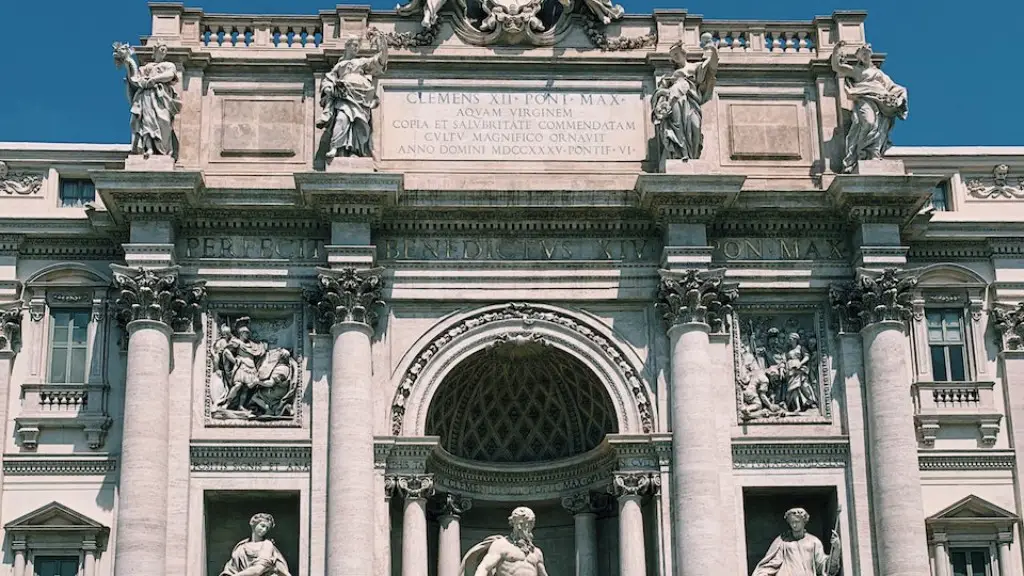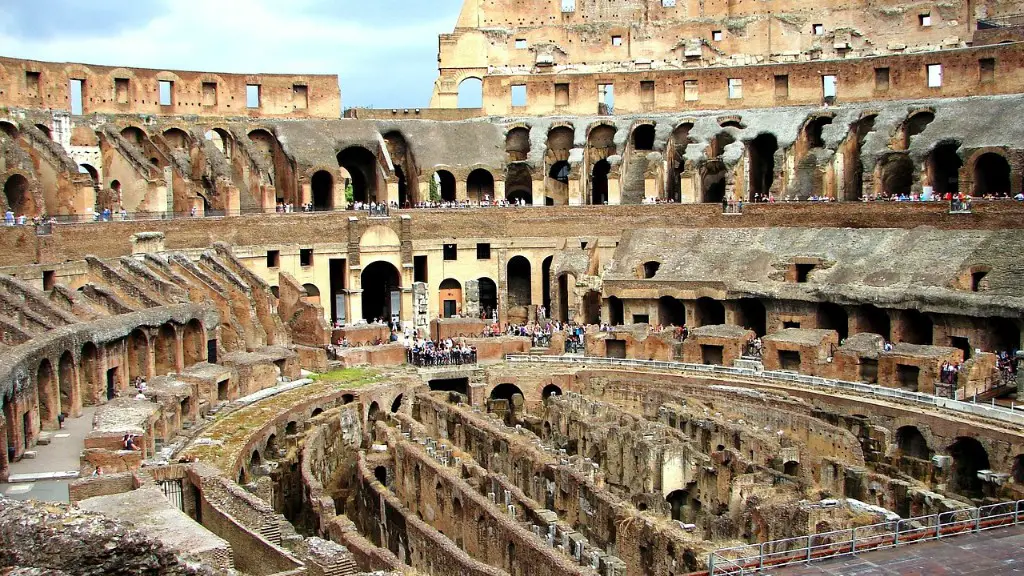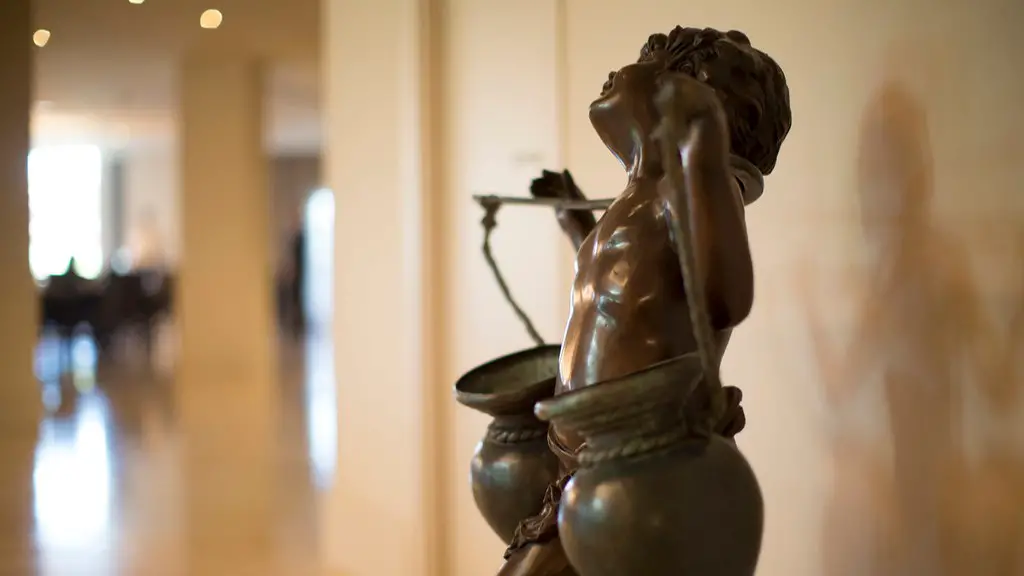Introduction to Ancient Rome and Its Religions
Ancient Rome was a major city in the world from 753 BC to 476 AD, situated in the Italian peninsula, with its capital city in the Italian city of Rome. Ancient Romans developed a polytheistic belief system, which incorporated the old Etruscan and Greek gods, as well as gods of the Roman people’s own preferences. Ancient Rome was a highly spiritual society, in which religious ceremonies, festivals and holidays were held regularly.
The primary religions practiced by the ancient Romans centered around the worship of the gods, including household gods, the Roman state deity, Jupiter, and ultimately the Roman Emperor. Ancient Rome also had a strict legal system, which was filled with religious regulations and punishments. The Roman religion was an intricate part of their everyday life and this article will explore why.
Rituals and Religion in Ancient Rome
Rituals and festivals in Ancient Rome were filled with religious symbols and traditions that date back to the Founding of Rome. According to the historian, Livy, the first festival held in Ancient Rome was the “Lupercalia”, which was a festival dedicated to the gods Lupercus and Fauna, in which goats and dogs were sacrificed. Other festivals and rituals in Ancient Rome included the Vestalia, Floralia, and the Saturnalia. In addition to festivals, Ancient Roman religion was also heavily connected to their everyday life and customs. People would pray or perform rites in the morning and in the evening, before or after meals, and in the presence of a storm or other natural occurrence. People were also seen consulting oracles, such as the Oracle of Delphi, and other methods of divination through dreams, observations, and even the entrails of animals.
Roman Religion and Its Impact on Politics and Society
Ancient Roman religion had a tremendous impact both on society and politics. The religion of Rome was highly intertwined with the Roman state, and this allowed for the Roman Empire to invest in its religious presence. This religious presence served to guarantee order and stability. In addition, Ancient Roman religion was seen as a means to express membership within a group as well as contributing to the overall Roman identity. Membership to a particular cult or religion often provided opportunities for public display and even public office, which further solidified the importance of Roman religion.
Roman religion was also heavily influential in politics, particularly in the formation of Rome’s laws. Some of the most crucial aspects of the Roman religious system formed the basis of Rome’s justice system. In particular, people were held responsible for their actions, even if their actions were based upon religious superstition, as they were seen responsible for their gods’ good or bad fortunes. This principle was set forth in the “Twelve Tables” of 451-450 BC, which classified different types of superstitions as either good or bad. This allowed people to be held responsible for their own actions, regardless of whether they were undertaken under religious influence.
Roman Religion and the Spread of Ancient Rome’s Influence
In addition to providing the basis for Rome’s laws and societal structure, religion was also used as a means of controlling and influencing foreign populations. Ancient Roman religion was always seen as an essential part of making peace and maintaining control over different regions. As a result, Rome was able to expand its influence and power by spreading its gods and beliefs in nations, who then accepted Roman authority.
In some cases, this form of religious expansion occurred in a violent manner, as with the Roman conquest of Gaul in the first century BC. In other cases, Rome was able to assimilate the beliefs of other nations in a peaceful, consensual manner, such as the adoption of the Greco-Roman cults in Etruria in the late fourth century BC, or the adoption of the Greek gods in Sicily during the second century BC. These kinds of peaceful exchanges between Rome and its conquered territories allowed for a more peaceful approach to establishing Roman rule.
Conclusion of the Roman Religion
In conclusion, the Roman religion was one of the most influential factors in the rise and spread of Roman power and influence. It provided a mechanism for ordering the Roman state and for expanding Rome’s presence throughout the known world. In addition, it was deeply embedded in everyday Roman life and cultures, providing a distinctive character to their society. Thus, it can easily be argued that it was the Roman religion that provided the foundation for the success of the Roman Empire.
The Impact of the Roman Religion on Christianity
The Roman religion had a huge impact on Christianity. Christianity was based on the Israeli religion, which had similar rituals as the Roman religion. The Roman Empire adopted Christianity as the official state religion in the fourth century AD, and became one of the most influential faiths in the world. This meant that the Roman religion provided a platform for Christianity to grow and spread, developing its own distinct rituals and beliefs that blended the Roman traditions with the teachings of the Israeli prophets.
The Roman religion also had a major influence on the development of the Christian church structure. The Christian church structure was highly similar to the religious organization of the Roman Empire, using a hierarchical structure with leaders, priests, and commoners, and establishing a code of laws. In addition, many of the core beliefs and moral beliefs of Christianity, such as love and charity, were heavily based on the values of the Roman religion.
The Lasting Influence of the Roman Religion
Although the Roman religion no longer exists, its influence can still be seen in our world today. Many of the rituals and beliefs that were practiced by the Ancient Romans are still practiced in some way today. For example, Roman customs such as the sacrificing of animals, or using omens and auguries to divine the future, are still practiced in some cultures. In addition, some scholars argue that the Roman religion has had a profound influence on modern forms of religion, such as Christianity.
The Roman religion also played a major role in the spread of knowledge and beliefs throughout the ancient world, providing a bridge for the development of numerous cultures, religions, and beliefs that still exist today. Thus, it is clear that the Roman religion had a massive impact on our world and our lives today.
The Role of Roman Religion in Contemporary Society
The Roman religion continues to have a strong influence on many aspects of our lives today. For example, the Roman gods and goddesses are still widespread and remain popular in popular culture. Roman rituals and beliefs continue to be studied, practiced, and celebrated by many people today. In addition, the classically-inspired architecture of the Roman Empire remains extremely popular, and has been adopted by numerous countries in the present day.
The Roman religion is also the basis for many of the European laws that are still in place today. The Roman codes of law, such as the Twelve Tables and the Lex Julia, were some of the earliest forms of legislation in the Western world and continue to influence legal systems around the world. Thus, it is clear that the Roman religion continues to have a significant influence on our lives and societies today.
The Relevance of the Roman Religion in our Lives
Despite the fact that the Roman religion no longer exists, it continues to be relevant in many areas of our lives today. Its distinct system of beliefs, rituals and laws has had a major impact on the development of the Western world and its culture, and still serves as a form of inspiration for many people today. In addition, its influence can still be seen in popular culture, architecture, and legal systems. Thus, it is without a doubt that the Roman religion is an important influence in our lives today.



